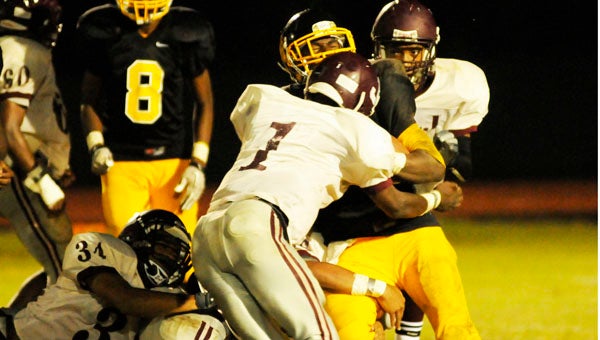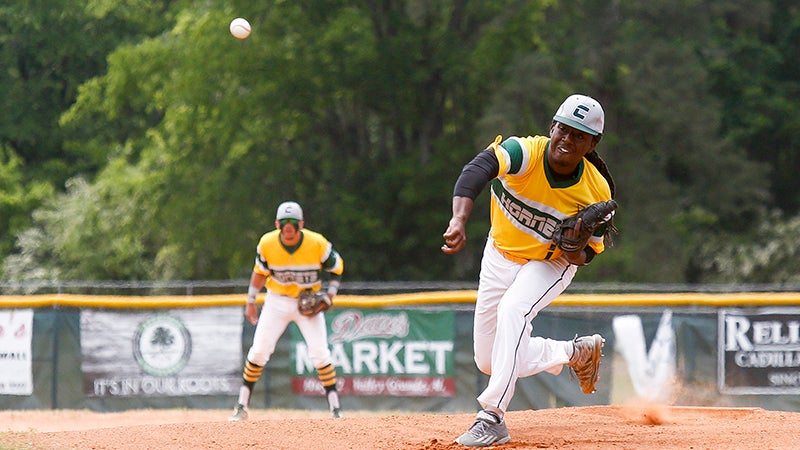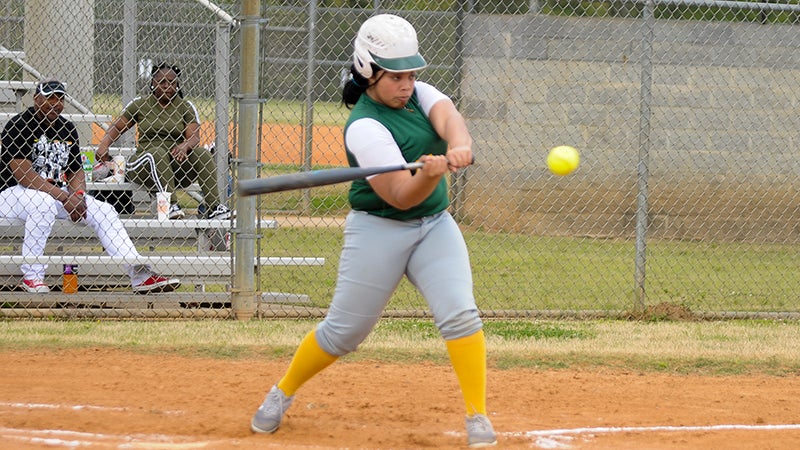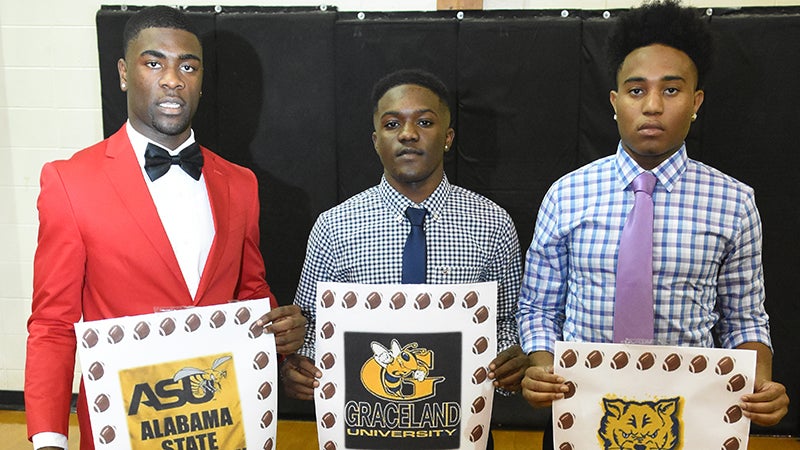Local coaches teach players how to safely tackle
Published 3:40 pm Saturday, July 27, 2013

An Ellwood Christian football player appears to take a helmet-to-helmet hit on a play against A. L. Johnson last season in a game at Ellwood Christian. With football practices about to get underway, local coaches are preparing to teach their players the correct and safe way to make a tackle. –File Photo
Finding a way to make football — a sport frequently celebrated for vicious tackles and powerful hits — safer has become a hot-button debate around the nation. At the highest levels of the sport, the NFL and NCAA continue to pass rules that will diminish head-to-head contact in games in hopes of lowering the number of serious injuries.
With August approaching and football practices getting closer every day, local coaches are taking every precaution to make sure their players know the proper way to tackle.
“We’ve always taught them not to drop their head. Not to lead with the crown of the helmet to prevent injuries,” Ellwood Christian Academy head coach Mike Stokes said. “As everybody is saying, concussions are probably the top injury in football besides knee injuries.”
The message from all coaches locally seems to be clear: Keep your head up.
“You want to hit number to number with your head up. We don’t teach kids to initiate contact with their head,” Keith head coach Harry Krum said. “In fact, on the helmet there is a sticker that says your helmet is for head protection, it is not to be used as a battering ram.”
According to other media sources, the Center for Disease Control and Prevention says that high school athletes suffer an estimated 2 million injuries each season.
The National Federation of State High School Associations — which establishes rules for most sports in the United States, including football played by members of the Alabama High School Athletic Association — lists “keeping the head out of football” in capital letters as its first point of emphasis for the 2013 football season. The association’s five paragraph notes on prohibiting helmet to helmet contact says “direct helmet-to-helmet contact and any other contact both with and to the helmet must be eliminated from the sport of football at the interscholastic level.” It continues, saying contact with the helmet should be “penalized consistently and without warning” and “when in doubt, contact to and with the helmet should be ruled as a foul by game officials.”
Players often see hard football hits, some legal and some illegal, on television and on the Internet; something the coaches say is part of the problem. Crum said while coaches cannot change what is happening on television, they can make their team aware of the correct way to make a tackle.
“It is hard to change the culture, but you can change the climate and what I mean by that is our culture is prevalent, it is all over,” Crum said. “It is all over the nation, all over television, and they see the celebrations in the NFL. It is going to be hard for you to affect the culture, but you can the climate — the area you are in charge. As a coach it is important for you to say, ‘it starts with us.’”
Crum’s team uses a method called “Safer and Surer Tackling”, a method taught by Coach Hugh Wyatt, something he has used since the early 2000’s.
“The methodology behind it is the proper way to hit and that helped with kids seeing hitting as something that is fun, because there are a lot of kids that are scared to hit, because they have been taught to hit wrong,” Crum said. “You always want to see what you hit, so that means keeping your head up. That’s what we’ve been trying to do with Safer and Surer Tackling.”
Crum said a lot kids who lower their head when tackling are scared of the contact, because they have not been taught the right technique.
“A lot of kids will lower their head because they are scared to hit,” Crum said. “They will lower their head out of fear, but if you teach a kid how to hit the proper way, most of the time he is going to keep his head up.”
Concordia College Alabama head coach Don Lee spent two seasons as a running backs coach with the NFL’s Arizona Cardinals, so he has seen tackling evolve at all levels of play. He said most of the guys in the NFL do not tackle correctly, which younger players see and try to emulate.
“A lot of them are looking at the NFL and 95 percent of their tackling is not correct,” Lee said. “You look at their body and their strength, when you’ve got the younger kids trying to do it and they don’t work out as much as the NFL guys, so you kind of start seeing the correct way of tackling go away. They shoot at the ankles, dive at the feet.”
Stokes said he has never really liked one of his players celebrating a hit. He said a few years ago one of his players made a big deal out of a hit and he sat him down.
“You don’t celebrate when you make a bad play, so let’s not celebrate when you make a good one until you have won the football game,” Stokes said.
He said part of the reason for some of the serious injuries in today’s football games are that players are so much more athletic than they were years ago.
“Athletes now are so much bigger, faster and stronger. In the older days, you had defensive tackles that were 250 pounds,“ Stokes said. “Now you have linebackers and strong safeties that are that size. Athletes now train year around and they are so much bigger, faster and stronger now.”
Selma head coach Leroy Miles said a lot of times it is hard to break a kid from lowering his head when making a tackle.
“Sometimes it is tough to keep kids from wanting to do that because they feel like they aren’t making a tough tackle, but it is about safety,” Miles said. “It is about the health of the kids.”
The coaches all agreed that teaching the proper tackling technique starts at the youth level and Selma Parks and Recreation Director Elton Reece is taking precautions as well. Reece is bringing in former Selma High School football player Chico Cleveland, who also played football at UAB and in the European Football League, to teach tackling.
“I’m going to hire him to teach my coaches first how to teach proper techniques of tackling,” Reece said. “Then, we are going to have a camp for kids to work with the coaches.”
Reece, who has been involved with the Parks and Recreation since 1972, said he has not had many serious injuries in youth leagues, because the players are small, which means the hits are not as severe.





